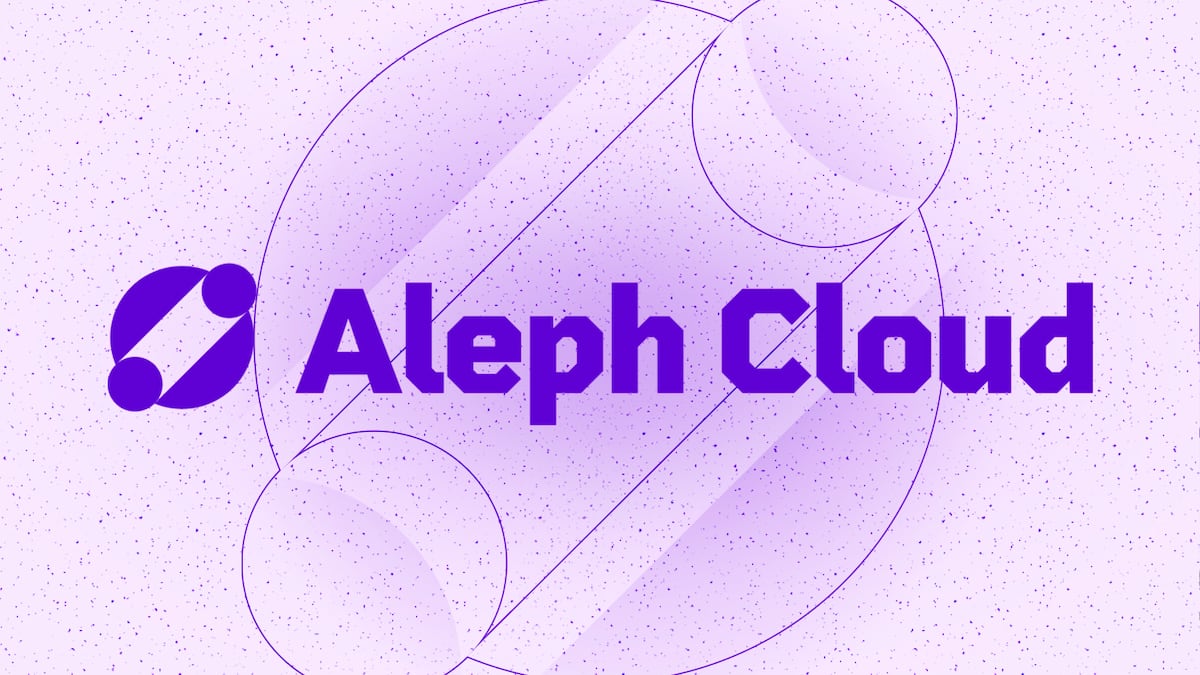Decentralised infrastructure has become a critical focus area for Web3 and AI builders. From Ethereum rollups using modular DA layers to AI protocols deploying agents on decentralised GPU networks, builders are moving away from centralised dependencies.
This shift is accelerating with the rise of decentralised physical infrastructure networks (DePINs) — an ecosystem now valued at over $20 billion, spanning storage, VPNs, IoT devices, and compute.
Since the AI boom of the early 2020s, DePIN has rapidly adapted to meet demand for trustless compute, GPU availability, AI compatibility, censorship resistance, and storage.
Aleph Cloud is helping pioneer this transformation. It offers a full-stack decentralised cloud platform: compute, storage, GPU access, indexing, hosting, and privacy-preserving infrastructure, all in one unified system.
The platform now offers a broader range of tools for developers building decentralised applications, data-heavy workloads, or privacy-preserving systems.
Unlike traditional cloud providers that rely on centralised servers, Aleph distributes workloads across a global network of independently operated nodes.
Developers can run functions on demand or deploy long-running virtual machines, all within an infrastructure that avoids single points of failure.
Inside Aleph’s infrastructure
One of Aleph’s most distinctive features is its support for confidential compute. It allows sensitive workloads to be processed inside secure hardware environments known as Trusted Execution Environments.
In practice, this means data remains encrypted and isolated, even from the machines running the computations. This aligns with growing interest in privacy-first compute, especially among those in regulated industries such as healthcare, biometric identity, and AI systems handling personal data.
The platform is also rolling out GPU support through a community-powered model. Independent node operators contribute GPUs, which can then be accessed virtually for tasks like AI model training, image generation, or simulation.
This functionality is currently in private beta and adds a new layer of performance capability to the decentralised stack.
Behind the scenes, Aleph operates on a peer-to-peer architecture that includes Compute Resource Nodes and Core Channel Nodes. These components handle scheduling, task execution, and data availability, without the need for central coordination.
Flexible infrastructure for next-gen systems
Aleph Cloud is built for developers who require more flexibility, control, or privacy than traditional cloud services typically offer.
On the Web3 side, it’s being used to host DeFi protocols, run backend services for dApps, and serve dynamic metadata for NFTs and blockchain-based games.
Because the platform supports persistent virtual machines, it can also function as the core backend for decentralised social networks or DAO tooling.
Beyond crypto, teams are exploring more advanced use cases, such as deploying private AI agents or training models using confidential compute.
As agentic AI grows more autonomous by executing smart contract interactions, orchestrating workflows, or even managing DAOs, infrastructure like Aleph Cloud provides the necessary offchain compute, persistent environments, and privacy guarantees to support them.
This has made the platform appealing to developers working on privacy-focused machine learning tools, especially those handling sensitive datasets.
Enterprise builders, meanwhile, are using Aleph to run secure B2B applications that require high uptime and compliance-ready infrastructure.
With GPU support being gradually rolled out, the platform is also becoming viable for rendering-intensive projects and simulation-heavy environments such as game engines or virtual labs.
Overall, Aleph is designed to support flexible, composable systems that can operate fully off-chain or interact with smart contracts across multiple networks.
Where chain meets cloud
The broader trend across DePIN is toward minimal-layer modularity, where decentralised infrastructure acts as plug-in modules governed or triggered by smart contracts. Thus, many projects in the ecosystem make themselves available across multiple blockchains.
Aleph is designed to be chain-agnostic. It currently supports Ethereum (and its L2s), Solana, Avalanche, Sonic, BNB Chain, Tezos, and more — with smart contract-based triggers allowing compute jobs or file updates to be called directly from onchain activity.
This cross-chain compatibility makes it particularly useful for multichain applications, cross-network oracles, and decentralised frontends that need to remain chain-neutral.
Aleph’s integration model follows a modular trend seen across leading DePIN networks, with blockchain triggers serving as the control layer for offchain compute and storage operations.
This decoupled approach enables builders to mix and match execution, DA, and compute providers without sacrificing coordination.
Proof of workload
Aleph Cloud has already seen adoption from web3-native projects and enterprise players.
Ubisoft has been operating one of Aleph’s Core Channel Nodes since 2021, using the network to host dynamic metadata for its NFT initiatives. Of note, its online multiplayer games Eden Online and Champions Tactics rely on Aleph to power community governance through Citizen ID cards and serve dynamic game logic and assets.
Identity-focused platforms like Synaps and Libertai are using Aleph to manage decentralised identity and data storage. Libertai, a confidential AI chat platform, uses Aleph’s secure compute layer to ensure private, user-owned conversations run inside TEEs.
DeFi projects are also adopting Aleph for backend infrastructure. HyperSwap integrates Aleph to power dynamic services for its decentralised trading stack, showcasing the demand for offchain compute in latency-sensitive market applications.
These early use cases signal interest in growing in decentralised compute and infrastructure that isn’t bound to any single vendor or cloud provider.
Aleph Cloud is part of a broader rethinking of how compute infrastructure should be delivered: open, programmable, and owned by its users.
As decentralised systems take on increasingly complex roles in AI, gaming, finance, and storage, Aleph is laying the groundwork for a cloud designed for the internet’s next iteration.


